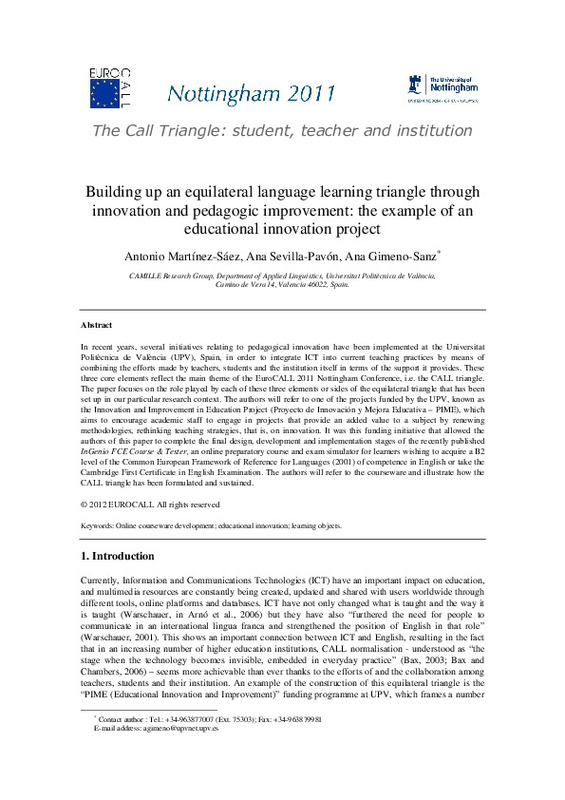JavaScript is disabled for your browser. Some features of this site may not work without it.
Buscar en RiuNet
Listar
Mi cuenta
Estadísticas
Ayuda RiuNet
Admin. UPV
Building up an equilateral language learning triangle through innovation and pedagogic improvement: the example of an educational innovation project
Mostrar el registro sencillo del ítem
Ficheros en el ítem
| dc.contributor.author | Martínez-Sáez, Antonio
|
es_ES |
| dc.contributor.author | Sevilla-Pavón, Ana
|
es_ES |
| dc.contributor.author | Gimeno-Sanz, Ana
|
es_ES |
| dc.date.accessioned | 2023-11-22T11:53:04Z | |
| dc.date.available | 2023-11-22T11:53:04Z | |
| dc.date.issued | 2012-03-22 | |
| dc.identifier.uri | http://hdl.handle.net/10251/200096 | |
| dc.description.abstract | [EN] In recent years, several initiatives relating to pedagogical innovation have been implemented at the Universitat Politècnica de València (UPV), Spain, in order to integrate ICT into current teaching practices by means of combining the efforts made by teachers, students and the institution itself in terms of the support it provides. These three core elements reflect the main theme of the EuroCALL 2011 Nottingham Conference, i.e. the CALL triangle. The paper focuses on the role played by each of these three elements or sides of the equilateral triangle that has been set up in our particular research context. The authors will refer to one of the projects funded by the UPV, known as the Innovation and Improvement in Education Project (Proyecto de Innovación y Mejora Educativa – PIME), which aims to encourage academic staff to engage in projects that provide an added value to a subject by renewing methodologies, rethinking teaching strategies, that is, on innovation. It was this funding initiative that allowed the authors of this paper to complete the final design, development and implementation stages of the recently published InGenio FCE Course & Tester, an online preparatory course and exam simulator for learners wishing to acquire a B2 level of the Common European Framework of Reference for Languages (2001) of competence in English or take the Cambridge First Certificate in English Examination. The authors will refer to the courseware and illustrate how the CALL triangle has been formulated and sustained. | es_ES |
| dc.description.sponsorship | We are greatly indebted to the Valencian Regional Government (Generalitat Valenciana) for funding Antonio Martínez-Sáez and Ana Sevilla-Pavón’s research grants (FPI) and to the Universitat Politècnica de València for partly funding the development of the English B2 Preparatory Online Course through its educational innovation and improvement funding scheme (Proyecto de Innovación y Mejora Educativa -PIME), during the 2010-11 academic year. | es_ES |
| dc.language | Inglés | es_ES |
| dc.publisher | Universitat Politècnica de València | es_ES |
| dc.relation.ispartof | The EuroCALL Review | es_ES |
| dc.rights | Reconocimiento - No comercial - Sin obra derivada (by-nc-nd) | es_ES |
| dc.subject | Online courseware development | es_ES |
| dc.subject | Educational innovation | es_ES |
| dc.subject | Learning objects | es_ES |
| dc.title | Building up an equilateral language learning triangle through innovation and pedagogic improvement: the example of an educational innovation project | es_ES |
| dc.type | Artículo | es_ES |
| dc.identifier.doi | 10.4995/eurocall.2012.16203 | |
| dc.rights.accessRights | Abierto | es_ES |
| dc.contributor.affiliation | Universitat Politècnica de València. Departamento de Lingüística Aplicada - Departament de Lingüística Aplicada | es_ES |
| dc.description.bibliographicCitation | Martínez-Sáez, A.; Sevilla-Pavón, A.; Gimeno-Sanz, A. (2012). Building up an equilateral language learning triangle through innovation and pedagogic improvement: the example of an educational innovation project. The EuroCALL Review. 20(1):121-125. https://doi.org/10.4995/eurocall.2012.16203 | es_ES |
| dc.description.accrualMethod | OJS | es_ES |
| dc.relation.publisherversion | https://doi.org/10.4995/eurocall.2012.16203 | es_ES |
| dc.description.upvformatpinicio | 121 | es_ES |
| dc.description.upvformatpfin | 125 | es_ES |
| dc.type.version | info:eu-repo/semantics/publishedVersion | es_ES |
| dc.description.volume | 20 | es_ES |
| dc.description.issue | 1 | es_ES |
| dc.identifier.eissn | 1695-2618 | |
| dc.relation.pasarela | OJS\16203 | es_ES |
| dc.contributor.funder | Generalitat Valenciana | es_ES |
| dc.contributor.funder | Universitat Politècnica de València | es_ES |








